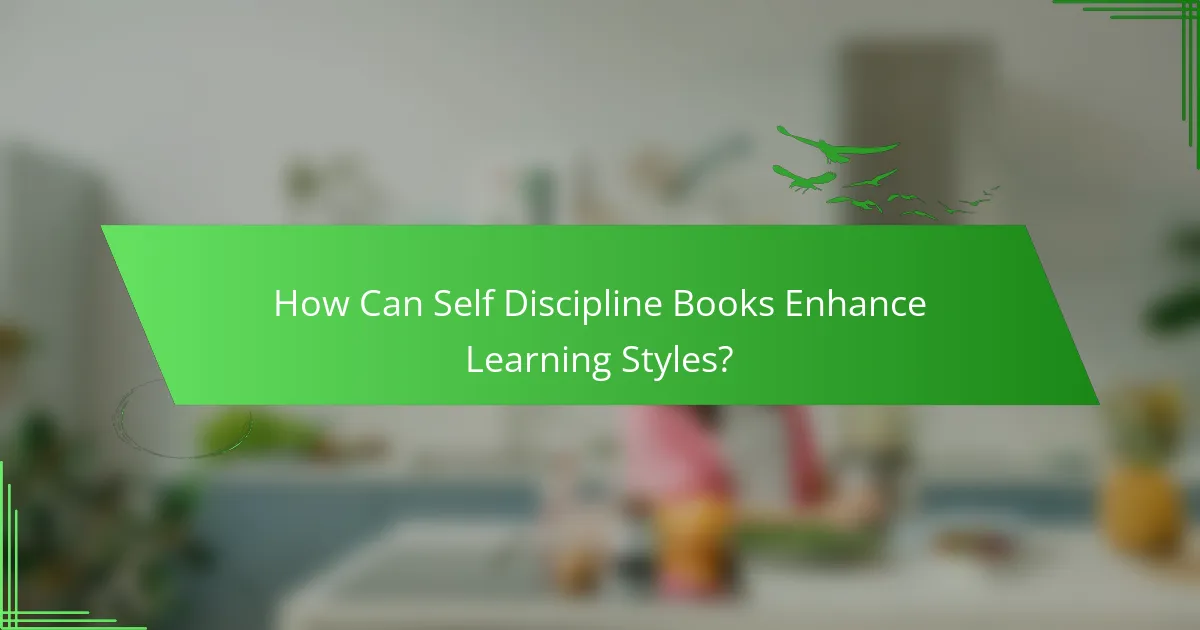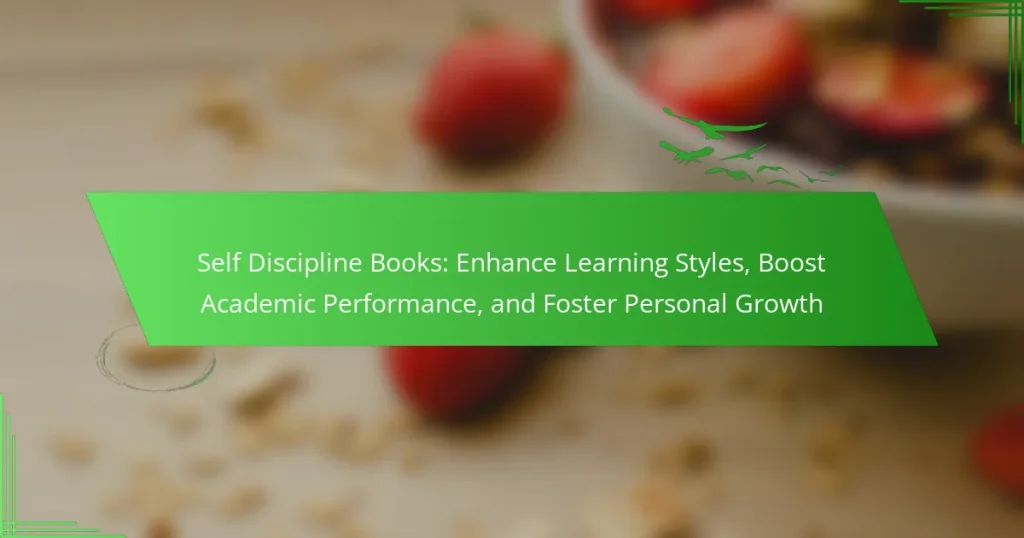Self-discipline books enhance focus and motivation, crucial for academic success. They provide strategies for effective study habits, time management, and goal setting. These resources foster personal growth by instilling responsibility and resilience. Unique attributes such as innovative frameworks and interactive exercises make these books particularly impactful for learners.

How Can Self Discipline Books Enhance Learning Styles?
Self-discipline books enhance learning styles by promoting focus, motivation, and effective study habits. These books provide strategies that cater to various learning preferences, leading to improved academic performance. For instance, they often include techniques for time management and goal setting, which are essential for self-directed learners. As a result, readers can tailor their study approaches, fostering personal growth and resilience. Research shows that disciplined learners achieve higher grades and retain information better, illustrating the books’ significant impact on educational outcomes.
What Are the Key Learning Styles Addressed in Self Discipline Books?
Self-discipline books address several key learning styles to enhance academic performance and foster personal growth. These styles include visual, auditory, kinesthetic, and reading/writing preferences.
Visual learners benefit from diagrams and illustrations found in many self-discipline books, which help to clarify concepts. Auditory learners gain from listening to audiobooks or discussions surrounding self-discipline topics. Kinesthetic learners engage through practical exercises and activities recommended in these books, while reading/writing learners thrive on written content and reflective journaling.
By catering to these diverse learning styles, self-discipline books effectively boost retention and application of the principles discussed, leading to improved outcomes in both academic and personal development.
How Do Self Discipline Books Cater to Different Learning Preferences?
Self-discipline books cater to different learning preferences by offering diverse formats and approaches. Visual learners benefit from illustrated guides, while auditory learners may prefer audiobooks. Kinesthetic learners engage through interactive exercises. Research shows that tailoring content to learning styles enhances retention and application, leading to improved academic performance and personal growth.
What Techniques Do These Books Offer for Engaging Various Learning Styles?
Self-discipline books offer techniques to engage various learning styles by incorporating diverse strategies. These books often include visual aids, practical exercises, and reflective journaling to cater to visual, kinesthetic, and auditory learners. For example, visual learners benefit from diagrams and illustrations, while kinesthetic learners engage through hands-on activities. Auditory learners may find value in narrated content or discussions. By addressing these unique attributes, self-discipline books enhance academic performance and foster personal growth.

What Are the Unique Benefits of Self Discipline Books for Academic Performance?
Self-discipline books significantly enhance academic performance by promoting focus, motivation, and effective study habits. These books provide practical strategies that help students manage their time, set goals, and maintain consistency in their studies. As a result, students who engage with self-discipline literature often experience improved grades and a deeper understanding of their subjects. Additionally, these books foster personal growth by instilling a sense of responsibility and self-control, which are essential for long-term success in academics and beyond.
How Do They Improve Focus and Concentration?
Self-discipline books improve focus and concentration by providing strategies that enhance learning styles and foster personal growth. These books often include techniques such as goal-setting, time management, and mindfulness practices, which help readers develop a structured approach to their tasks. As a result, individuals can minimize distractions and maintain sustained attention on their academic or personal projects. Research shows that consistent application of these principles leads to improved academic performance and overall productivity.
What Role Do They Play in Time Management Skills?
Self-discipline books play a crucial role in developing effective time management skills. They provide strategies that enhance focus, prioritize tasks, and establish routines. By cultivating self-discipline, individuals can better allocate their time and resources, leading to improved academic performance and personal growth. These books often include practical exercises that reinforce discipline, making it easier to implement time management techniques consistently.
How Can Self Discipline Books Boost Motivation and Perseverance?
Self-discipline books significantly boost motivation and perseverance by providing actionable strategies and insights. These books often emphasize goal-setting, self-reflection, and accountability, which enhance personal growth. Research shows that readers who engage with self-discipline literature tend to develop stronger habits, improving their academic performance and overall productivity. Additionally, these books cater to various learning styles, making the concepts accessible and applicable to a wide audience. By fostering a growth mindset, they empower individuals to overcome challenges and maintain focus on long-term objectives.

What Rare Attributes Make Certain Self Discipline Books Stand Out?
Certain self-discipline books stand out due to their unique attributes that resonate deeply with readers. These rare attributes include innovative frameworks, personalized strategies, and evidence-based practices. Books that incorporate storytelling elements often enhance relatability, making concepts more digestible. Additionally, those that offer interactive exercises foster engagement, allowing readers to apply lessons in real-time. Lastly, a strong emphasis on long-term mindset shifts rather than quick fixes distinguishes these books, promoting sustained personal growth.
Which Authors Are Considered Pioneers in This Niche?
Several authors are recognized as pioneers in self-discipline literature. Notably, Stephen R. Covey’s “The 7 Habits of Highly Effective People” emphasizes personal growth through discipline. Angela Duckworth’s “Grit” explores the role of perseverance in achieving long-term goals. Tim Ferriss, with “The 4-Hour Workweek,” challenges conventional productivity norms, promoting disciplined time management. Finally, James Clear’s “Atomic Habits” focuses on building effective habits through small, disciplined changes. These works collectively enhance learning styles and boost academic performance.
What Unique Frameworks or Models Do They Introduce?
Self-discipline books introduce unique frameworks that enhance learning styles and boost academic performance. These frameworks often include structured methodologies, such as goal-setting techniques, time management strategies, and habit formation processes. For instance, the SMART goals framework emphasizes setting Specific, Measurable, Achievable, Relevant, and Time-bound objectives. These methods foster personal growth by encouraging self-reflection and accountability. Additionally, cognitive behavioral approaches help readers understand the relationship between thoughts, emotions, and behaviors, promoting healthier habits and improved focus.
How Do Cultural Perspectives Influence the Content of These Books?
Cultural perspectives significantly shape the content of self-discipline books by influencing themes, examples, and values presented. Different cultures prioritize various aspects of self-discipline, such as collectivism versus individualism, which affects how authors approach personal growth. For instance, Western books may focus on individual achievement, while Eastern texts might emphasize community and harmony. This cultural lens impacts the strategies and techniques recommended, making the content resonate with specific audiences. Additionally, cultural narratives around education and success can dictate the tone and depth of academic performance discussions, tailoring advice to align with societal expectations.

What Practical Strategies Can Be Applied from Self Discipline Books?
Self-discipline books offer practical strategies that enhance focus, create effective routines, and cultivate resilience. These strategies can include setting clear goals, breaking tasks into manageable steps, and employing visualization techniques. For example, books often emphasize the importance of daily habits, which can significantly boost academic performance and foster personal growth. Implementing these strategies encourages learners to take ownership of their education and develop lasting self-discipline.
What Are the Best Practices for Implementing Lessons from These Books?
To effectively implement lessons from self-discipline books, focus on actionable strategies that align with personal learning styles. Start by identifying key concepts from the books and practice them consistently. For example, create a daily routine that incorporates time management techniques and goal-setting exercises. Engage in reflective practices, such as journaling, to assess progress and adapt strategies as needed. Additionally, consider joining study groups to enhance accountability and share insights, fostering a collaborative learning environment. Prioritize self-awareness to recognize strengths and areas for improvement, ensuring continuous personal growth.
What Common Mistakes Should Readers Avoid When Applying These Concepts?
Readers should avoid common mistakes such as neglecting personal reflection, skipping practical application, and ignoring diverse learning styles. Failing to assess one’s own discipline can hinder growth. Applying concepts without practice leads to superficial understanding. Additionally, not adapting strategies to fit individual learning preferences can limit academic performance.
How Can Readers Track Their Progress and Stay Accountable?
Readers can track their progress and stay accountable by setting specific goals, using self-discipline books as guides. These books often include practical exercises and tools for monitoring growth. Regularly reviewing progress against these goals fosters motivation and reinforces learning styles. Engaging with a community or accountability partner enhances commitment and provides support.




